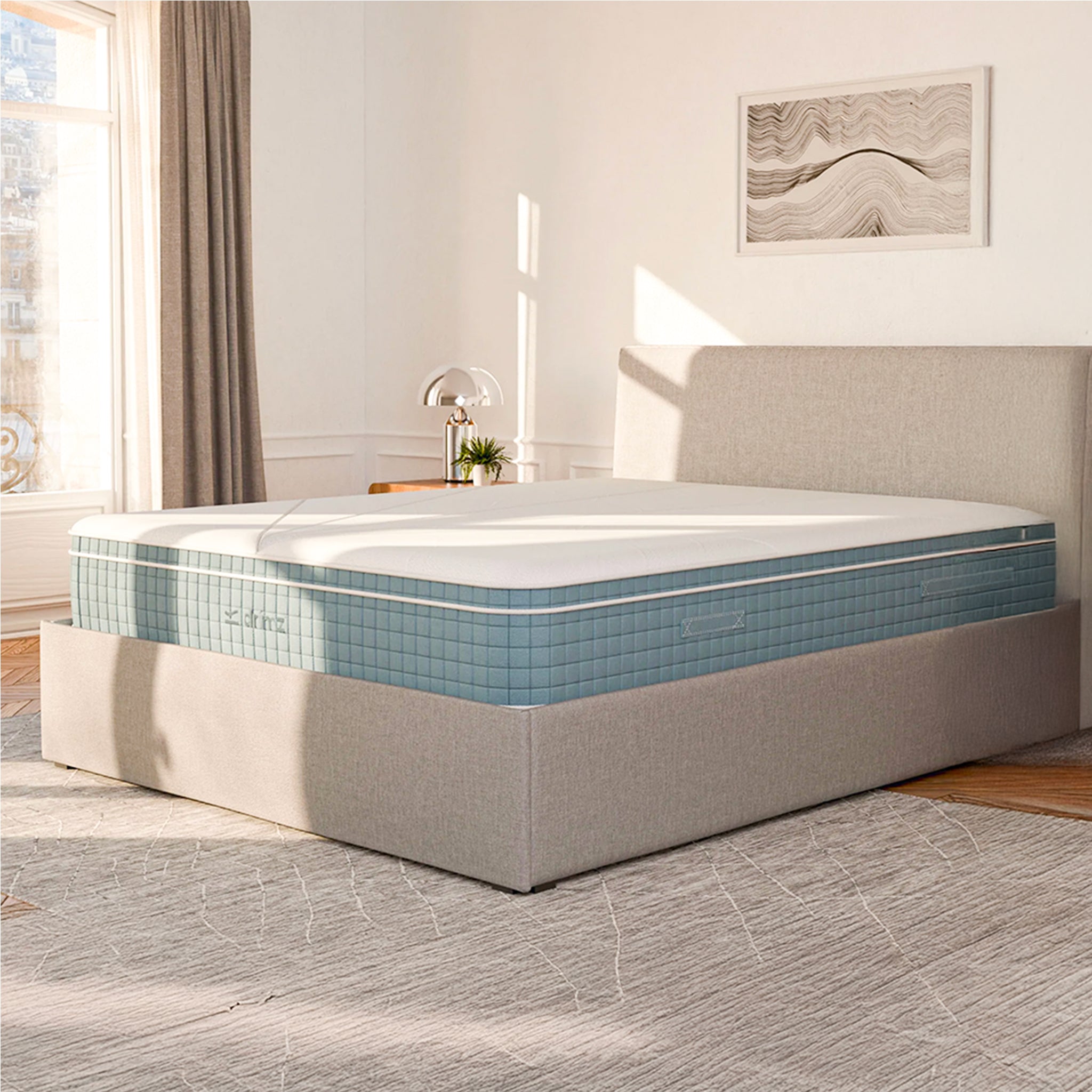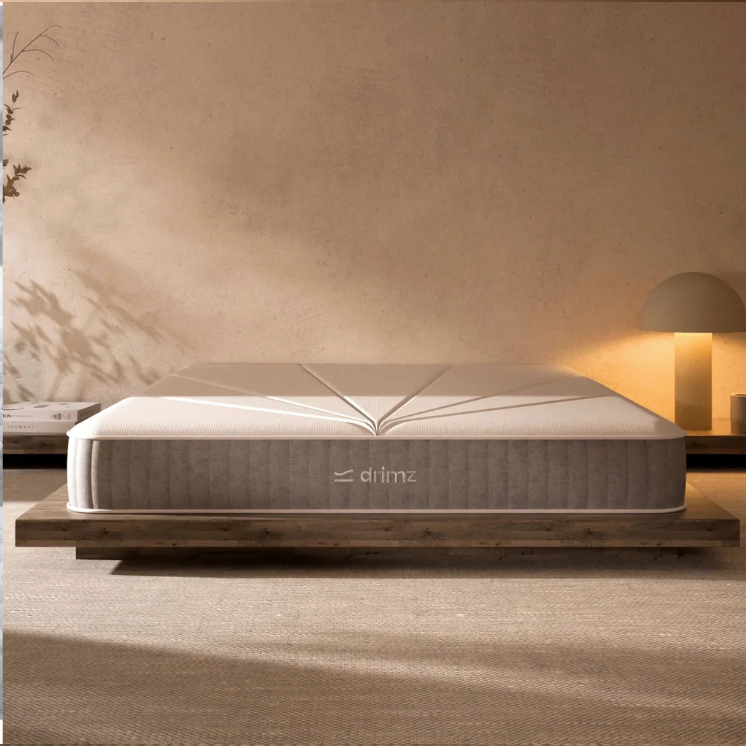Choosing between a hard and soft mattress can greatly impact the quality of your sleep, as well as your overall well-being. Sleep is essential for physical and mental regeneration, and the comfort of the mattress you choose plays a key role. Whether you have lower back pain or are simply looking for the best sleeping comfort , understanding the pros and cons of each type of mattress is essential to making an informed choice.
Characteristics of a hard mattress
A hard mattress provides firm support by evenly distributing body weight. Unlike a soft mattress, it offers a rigid surface that promotes proper spinal alignment, a key factor in avoiding lower back pain and other problems related to poor posture at night. This support is especially beneficial for back or stomach sleepers, as a mattress that's too soft could cause excessive sinking of the hips and spine.
Hard mattresses are often made from pocket springs , latex, or high-density foam. These materials ensure increased longevity and robustness, allowing the mattress to retain its shape longer, even after several years of use. Latex mattresses also offer a good balance between firmness and comfort, thanks to their natural elasticity, which provides optimal support without being too rigid.
Benefits of a hard mattress
- Increased support : Firm mattresses provide excellent support for the spine, helping to maintain proper posture throughout the night. They are particularly recommended for people suffering from chronic back pain or poor posture.
- Better blood circulation : Firmness reduces pressure on blood vessels, improving blood circulation . This can prevent numbness or nighttime pain, especially in sensitive areas like the shoulders or hips.
- Durability : Thanks to sturdy materials like latex or pocket springs, firm mattresses tend to be more durable. They therefore offer excellent value for money in the long run, as they wear out less quickly than their softer counterparts.
Disadvantages of a hard mattress
- Initial comfort : For some people, adjusting to the rigidity of a hard mattress can take time. This lack of flexibility can cause some discomfort or sleepless nights during the first few weeks of use as the body adjusts.
- Not suitable for some sleepers : Side sleepers may find that a mattress that is too firm puts uncomfortable pressure on their hips and shoulders. This can create painful pressure points and lead to restless sleep.
Characteristics of a soft mattress
Conversely, a soft mattress conforms closely to the body's contours, providing a cradling sensation. This type of mattress is typically made from memory foam or high-density foam , which are known for their ability to perfectly conform to the body's shape and reduce pressure points. This softness allows for better distribution of body weight, especially in areas where joints are stressed, such as the hips and shoulders.
A soft mattress is particularly recommended for side sleepers. It provides better cushioning for protruding parts of the body and optimal spinal alignment. If you suffer from lower back pain due to poor sleeping position, a softer mattress can provide additional comfort and relieve pain.
Benefits of a soft mattress
- Reduced pressure points : Soft mattresses minimize pressure points on sensitive areas of the body, including the hips and shoulders, promoting restful, pain-free sleep at night.
- Body adaptation : Thanks to the memory foam , the mattress adapts perfectly to the contours of the body, thus providing personalized comfort. This can be particularly beneficial for people who frequently change positions during the night, as the mattress instantly adjusts to movements.
- Ideal for side sleepers : Side sleepers will often find more comfort with a soft mattress, which effectively cushions pressure on the shoulders and hips, while maintaining good posture.
Disadvantages of a soft mattress
- Lack of support : A mattress that is too soft can provide insufficient support to the spine, which can lead to lower back pain, especially for back or stomach sleepers. Inadequate support can also cause excessive sinkage into the mattress, which disrupts the body's natural alignment.
- Rapid wear : Softer materials, such as memory foam, tend to sag more quickly than stiffer materials. This means that a soft mattress can lose its shape and support more quickly, requiring more frequent replacement.
What criteria should you use to choose your mattress?
There are several factors to consider before deciding between a hard or soft mattress . Depending on your sleeping habits, personal preferences, and specific health needs, there are some key criteria that will help you make the right choice.
Sleeping position
Sleeping position plays a central role in mattress choice. If you sleep on your back or stomach, a firm mattress is often recommended to ensure adequate spinal support and prevent excessive hip sinkage. Side sleepers , on the other hand, will benefit more from a soft mattress, which will cushion pressure points on the shoulders and hips.
Health problems
If you suffer from lower back pain or chronic back pain, it is recommended to opt for a firm mattress , which will maintain proper spinal alignment. Conversely, for joint or muscle pain, a softer mattress can provide relief by reducing pressure points.
Personal preference
Your comfort is subjective, and personal preference plays a major role in mattress choice. Some people enjoy the stability and firmness of a hard mattress, while others prefer the cocooning effect of a softer mattress. A compromise can often be found by combining a firm mattress with a soft mattress topper , allowing you to enjoy both support and comfort.
Body weight
Body weight is an important factor to consider when choosing a mattress. Heavier people will often find that a firmer mattress provides better support and prevents excessive sinkage, which can compromise spinal alignment. Lighter people, on the other hand, will often benefit from a softer mattress , which will better conform to their body shape and provide optimal comfort.
Specific types of mattresses
Spring mattress
Spring mattresses are particularly popular for their excellent ventilation and durability. They are available in various firmnesses and are often used in hybrid mattresses that combine the firmness of springs with the comfort of foam.
Foam mattress
A foam mattress offers great adaptability to body shapes, especially with materials like memory foam . This type of mattress is ideal for those who suffer from joint pain, as it helps reduce pressure points and maintain proper body alignment.
Practical advice for a better choice
View reviews
Reviews from other customers can often help inform your decision. They provide an honest look at the shopping experience and product durability. At Morphea Bed , we're fortunate to have a 4.8 rating on Yotpo , which proves that the majority of our customers are more than satisfied with their purchase.
Trial period
Finding out if a mattress is truly right for you often takes more than a simple in-store test. That's why Morphea Bed offers a 100-night home trial . This way, you can see how the mattress adapts to your body over the long term. And if it's not the right one, don't worry: returns are possible.
Conclusion
Ultimately, choosing between a hard or soft mattress depends on several factors, including your sleeping position, personal preferences, and support needs. Good sleep is essential for your physical and mental health, and the right mattress for your needs can truly transform the quality of your nights.




What size mattress should I choose for a good night's sleep?
Why buy a Morphea mattress topper for your comfort?